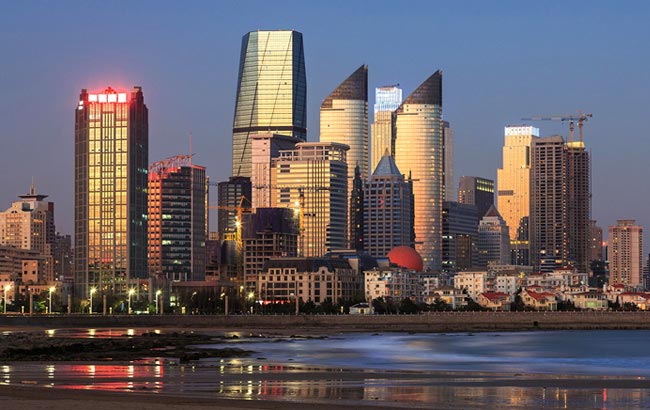Main Content
Sub-project 3
Implementation of a RRC in Qingdao
The fast growing port city of Qingdao has already been suffering from increasing water shortage for years. During the last 10 years, the SEMIZENTRAL approach has been developed under the general management of the Chair of Wastewater Technology of the Institut IWAR at the Technische Universität Darmstadt, in close cooperation with numerous German partners from industry as well as scientific partners from Germany and China. The joint project "Resource efficient and flexible Supply and Treatment Infrastructure Systems for Fast Growing Cities of the Future" within the frame of the BMBF funded program CLIENT China is divided in two phases. It comprises the worldwide first implementation of a semicentralized supply and treatment center (STC) and is realized in the context of the World Horticultural Exposition 2014 in Qingdao. The first phase (April 2012 - March 2013) includes preliminary activities necessary for implementation, i.e. adaption of the concept to the local conditions and expert monitoring of the planning and permission process. Purpose of the second phase (May 2013 - July 2016) is the validation, optimization, and further development of the research approach.
For implementing SEMIZENTRAL, it is planned to separately collect the accruing wastewater streams (greywater and blackwater) in a development area close to the World Horticultural Exposition for transport to a semicentralized supply and treatment center. The STC is designed for 12,000 population equivalents. Besides wastewater, biowaste (food residues) from the area will be treated in the STC. The treated and disinfected greywater will be reused as service water for toilet flushing, while the treated and disinfected blackwater will be reused for irrigation and street cleaning. This way, the domestic demand for drinking water is reduced by at least 30%. Via co-treatment of biowaste in the anaerobic thermophilic sludge treatment, the biogas yield will increase. By using the biogas, an energy self-sufficient operation of the STC is achieved and the dependence on external primary energy, mostly from fossil resources, is avoided.
While the WHE Group bears the investment and operating costs, the scientific monitoring of the implementation is supported by the German research network funded by BMBF (02WCL1266A-K). The joint project is led by the Chair of Wastewater Technology, Institut IWAR of TU Darmstadt.
SEMIZENTRAL’s objects of research include, inter alia, the energetic optimization of the STC and its related networks, validation of material flows regarding quality as well as quantity, usability of output flows, planning and approval processes, transferability of the approach to other locations and environmental challenges, possibilities for architectural creativity in combination with the energetic points of view, capacity building in the areas of plant operation and integrated infrastructure systems, validation and further development of analysis and control of service water systems as well as strategy development on the prevention of recontamination, development and adaption of MCR technology for integrated infrastructure systems and their application in the optimized usage of resources.
Duration Phase A: April 2012 - March 2013
Project funding reference number: 02WCL1215A-D
Partner: Abwassertechnik, Landmanagement, est, Kocks, E+H, Roediger Vacuum
Duration Phase B: May 2013 - July 2016
Project funding reference number: 02WCL1266A-K
Partner: Abwassertechnik, est, LM, Institut für Baubetrieb, Kocks, E+H, RV, m+p, Cosalux, Far Eastern Consulting, GECOc, Heyl, Emscher Wassertechnik, ISOE





